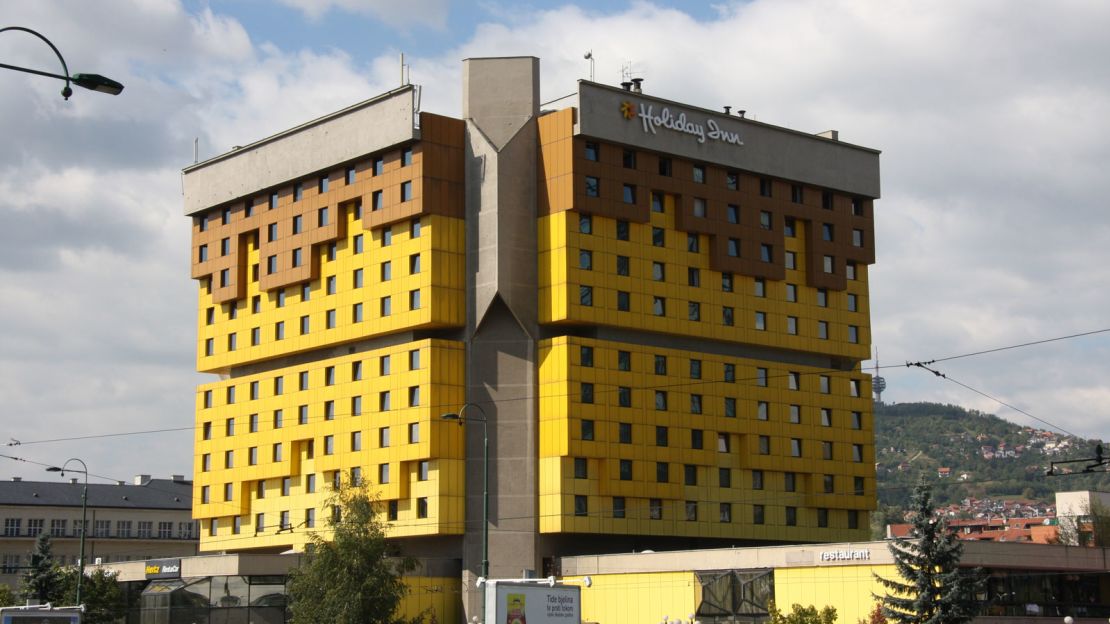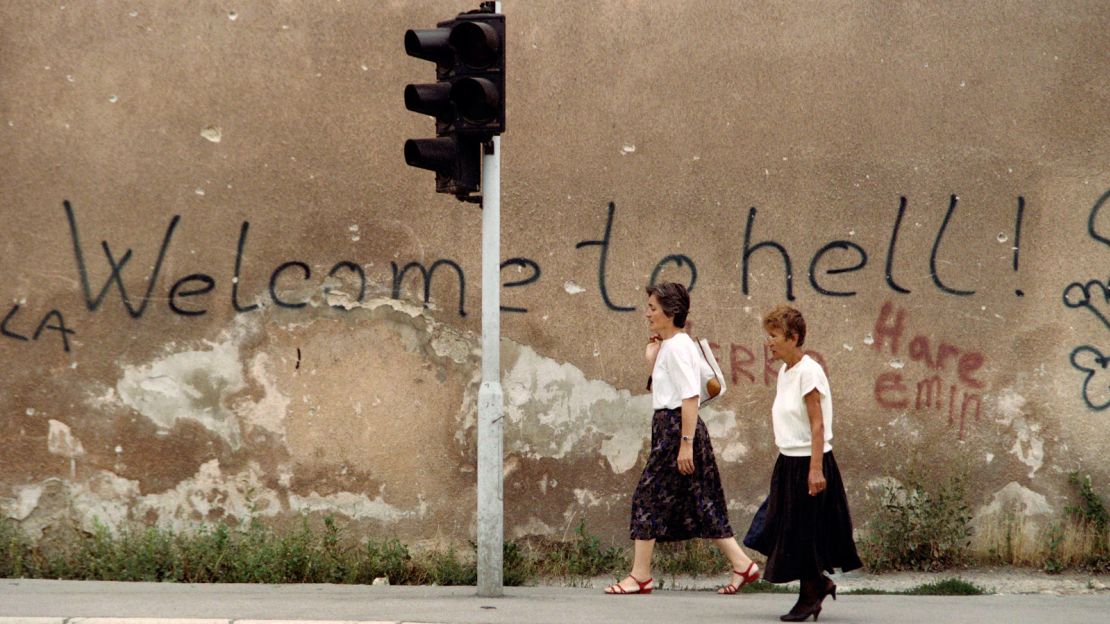It’s painted canary yellow and looks like it’s built from giant LEGO blocks – but the most remarkable thing about the Hotel Holiday in Sarajevo isn’t its appearance.
It’s that the hotel is here at all, given the adversity it’s faced in recent years, let alone enjoying a new lease of life.
A symbol of the Bosnian-Herzegovinian capital and a survivor of the 1990s Bosnian war, the historic hotel reopened last year after a tumultuous sell-off, license loss and bankruptcy.
Originally opened as a Holiday Inn for the 1984 Sarajevo Winter Olympics, the hotel became the glitzy accommodation for the International Olympic Committee leadership, the US and British Ambassadors to Yugoslavia, and US actor Kirk Douglas.
Indoor city

Back then, Bosnian architect Ivan ?traus intended to create an “indoor city” in the hotel, complete with facilities including a hair salon, travel agency and tobacconist.
“For those with an inclination to drink and dance, there was Discoteka ’84 in the basement, where the ‘latest international sounds’ could be enjoyed (or endured),” according to a history of the hotel by Professor Kenneth Morrison, a Balkans specialist at De Montfort University in the UK.
In Sarajevo, Ottoman, Austro-Hungarian and Communist-era architectural styles sit alongside each other. The hotel formed the next chapter.
“The Holiday Inn was supposed to look like a modernist take on an old Ottoman-style Sarajevan house. And it was built, of course, in this very interesting yellow color,” Morrison tells CNN, explaining how it was sometimes referred to as “jaundiced.”
“The building was architecturally very interesting – for Sarajevo, at the time, it was extremely modern, an international brand.”
New era
In 2017, the hotel has returned to its ’80s roots: The yellow fa?ade has been fully restored, travel agents’ signs fill the atrium, a hair salon offers the latest styles and the spa gives facials and OPI manicures.
Groups of women sit in the cavernous lobby, playing distractedly with their phones. One man barks at the receptionist, asking who will carry his luggage to his room as he looks around for an invisible servant.
Children of wealthy guests wander the corridors, which are adorned with 1980s décor – think standard lamps and navy blue carpet.
Discoteka ’84 doesn’t appear to be open during CNN’s stay – making it impossible to attest to the quality of the international tunes.
But there’s certainly character about the place, albeit in the form of an ’80s pastiche. The restaurant is all wood paneling and shouty upholstery.
Guests graze upon bowls of peanuts in the 24-hour bar, while rooms have mahogany furnishings and the most fabulous yellow bathroom ceramics.
On the front line

It’s a far cry from the days of the ’90s Bosnian conflict, when the former Holiday Inn’s fortunes turned.
In 1992, Sarajevo came under a 1,425-day siege, and the Holiday Inn was situated on “Sniper Alley,” one of the most dangerous positions in the city.
CNN Chief International Correspondent and Anchor Christiane Amanpour lived in the Holiday Inn for weeks at a time as she covered the war.
“Many times it was shot by artillery fire, mortars were fired that landed on or near it, windows were broken regularly,” Amanpour tells CNN Travel.
“I remember the coffee bar, which had a canopy on top of it, in the atrium lobby was hit and caught fire.”
Despite that – and the lack of hot water or electricity – journalists grew fond of the Holiday Inn.
“It was home, and as such it was where we all gathered, so we considered the Holiday Inn our recreation, our home”, she continues.
“It was where we woke up, where we went to sleep, where we visited each other, sometimes in each others’ rooms. It was where love affairs blossomed, it was where we worked, it was where we escaped death. It was really everything to many of us.”
Symbolic building
The hotel continued to attract aid workers and diplomats after the end of the war in 1995, and an initial renovation took place.
An Austrian businessman bought it in 2003 for a reported $23 million, but it lost its famous Holiday Inn branding in 2011.
The hotel spiraled downhill, and in 2015 was shut down by Bosnia’s State Investigation and Protection Agency. It took on its current incarnation as the Hotel Holiday in 2016, as part of the Hotel Europe chain owned by Bosnian businessman Rasim Bajrovi?.
“The hotel is a symbol of the [1980s] Olympics period, which was very important for the country and the capital city,” Fatima Alefendi?, Hotel Holiday’s sales and marketing executive manager, tells CNN Travel.
“We wanted to keep the previous look of the hotel because it is symbolic and well-known.”
Some relics from its former days as a Holiday Inn appear slightly too authentic.
During CNN Travel’s stay in early August, Hotel Holiday was using sundry items bearing the old Holiday Inn branding – an ice bucket here, a sticker on the old-fashioned room phone there.
They seem intended as kitsch souvenirs of the hotel’s past – but are also an apparent breach of the law.
“Any use of Holiday Inn branded material or of our Holiday Inn trade mark at the property following termination of the franchise agreement is illegal,” a spokesperson for parent company IHG tells CNN Travel.
“The hotel ceased to be a Holiday Inn when IHG terminated the franchise agreement in May 2011.”
Hotel Holiday says that they kept some old items as “a reminder of past times,” but will ensure their use does not continue.
MORE: 15 hot new hotels to check out in 2017
Reincarnated hotel
?traus’s hotel has become part of Sarajevo, which is now happily a short weekend break destination, instead of a city under siege. Visitors are no longer confined to the likes of war correspondents and diplomats.
“Guest come for many reasons – skiing, snowboarding, swimming, to see cultural and historical monuments, and of course to be part of the Sarajevo Film Festival,” says Alefendi?, referring to the internationally acclaimed celebration of cinema which takes place each summer. “We are available for our guests 24/7.”
Morrison returned this year with his eight-year-old daughter, having not visited since its renovation and reopening, and was impressed with what he found.
“The swimming pool was open, the fountains in front of the hotel were working, there was a man on the door”, he says. “The hotel has once again become a central part of Sarajevo life, which is great.”
In the atrium lobby, a new mint green and white canopy replaces that which went up in flames during the ’90s battles.
Beneath it, guests walk by, seemingly oblivious to the hotel’s troubled past, a microcosm of Bosnia-Herzegovina’s struggles.
Perhaps it doesn’t matter. The building already has a legion of fans – journalists, historians, Sarajevans and architects among them.
Hotel Holiday, Zmaja od Bosne 4, 71000 Sarajevo, BiH
Lizzie Porter is a freelance journalist focusing on post-conflict countries and the Middle East. She is based in Beirut, Lebanon.







